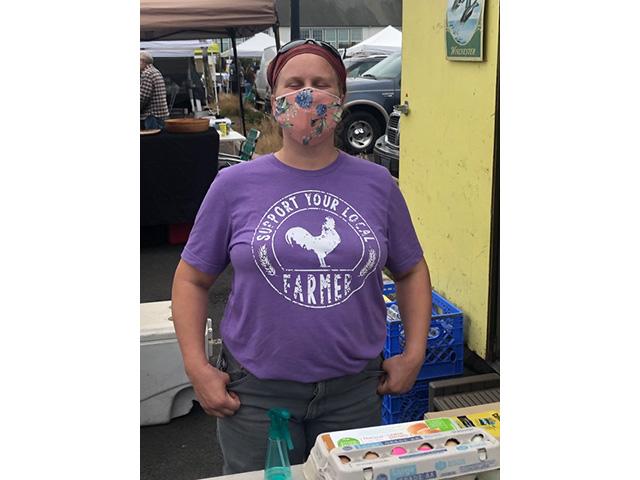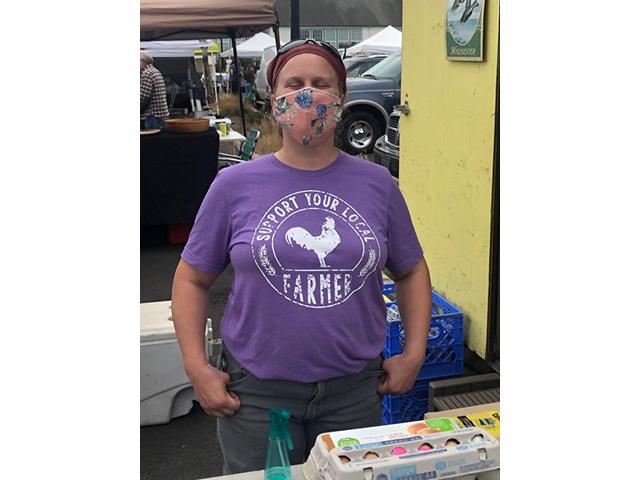An Urban's Rural View
Farmers Markets Lead Way Back to Normal
The Newport Farmer's Market was a sad affair during the worst part of the pandemic. As I reported back then, the Newport, Oregon, market was only allowing 75 shoppers in at a time. The dining tables were gone, as were the stands selling barbecue, fish tacos and grilled cheese sandwiches. The market had even banned dogs. (https://www.dtnpf.com/…)
Now, despite continued new variants of COVID-19 like BA.5, the world is getting back to normal. And if Newport is any indication, farmers markets are leading the way.
The hot-food stalls, the dining tables, the artisans -- they're all back. Oh, some of the vendors are different -- goodbye grilled cheese, hello crepes. The salsa we loved at Gathering Together Farms is no more; the salsa maker has moved on. But, on the whole, the market is much as it was pre-pandemic.
The rest of the world isn't quite as far along the road back to normal. Japan is coping with a COVID resurgence. Americans who want to tour Japan will need a visa (they used to be able to visit without one) and must travel with a tour group, to cite just two of the restrictions Japan is imposing.
Supply-chain disruptions linger. Airlines in Europe can't keep up with the travel-deprived hordes who are desperate to fly again. London's Heathrow Airport has limited departures to 100,000 passengers a day and British Airways has temporarily stopped selling tickets on all its flights, domestic and international, out of Heathrow. (https://www.wsj.com/…)
P[L1] D[0x0] M[300x250] OOP[F] ADUNIT[] T[]
In the U.S., supply-chain disruptions are part of what's fueling inflation. Waiting at the dealership for my car to be serviced the other day, I noticed a $2,000 "market adjustment" on a showroom-car price sticker. Translation: With demand for new cars outpacing supply, the dealer is adding $2,000 to the price because that's what the "market" will bear.
While the world progresses at varying speeds toward normal, the pandemic has brought about some lasting changes in how normal is defined. For example, even if the fear of infection eventually disappears altogether, many people will continue to telecommute and many meetings will continue to be done online. The Zoom boom is one of COVID's legacies.
Another is an increasing realization of the risks in relying on overseas factories to provide for a society's critical needs. As a result, governments are again pushing domestic manufacturing.
President Joe Biden just signed the Chips and Science Act, which provides more than $52 billion in subsidies for domestic semiconductor manufacturing and $200 billion over 10 years for science research to compete with China. It was the pandemic experience with chip shortages that made this legislation possible.
Could masks become another of COVID's legacies? Most Americans no longer wear them. Many never did. Some, though, continue to find comfort in them, even at the Newport Farmer's Market.
Perhaps, for a small percentage of Americans, masks will become a permanent thing. In Tokyo and Hong Kong, people with colds or flu have worn masks in public for decades. There, trying to avoid spreading germs is considered a matter of common courtesy. Here, masks are more likely to be worn by folks trying to protect themselves, especially the immunocompromised.
Seeing others wear masks bothers some people. It shouldn't. Whether the bothered believe it or not, wearing a mask isn't a political statement. It's a statement about risk toleration. Why should anyone care that someone else is less willing to take risks?
Anticipating that masks are here to stay, Apple made an interesting software change a few months ago. The iPhone's facial recognition feature now works even when the phone's owner is masked.
For all that some things have changed, in some cases permanently, normal is still the same good old normal at the Newport Farmer's Market. It is, as it's always been, more than a place to buy fresh fruits and vegetables and meat.
It's a place to have breakfast or lunch in the open air with people you just met. It's a place to sip Herb's coffee from the "Old River" beans he roasts himself and chat with Sarah at Walker Farms' stand and pet the dogs, who have been allowed back in.
It's a crowded, busy place where you feel alive. That feeling went away during the worst of the pandemic. Thankfully, we've got it back.
Urban Lehner can be reached at urbanize@gmail.com
(c) Copyright 2022 DTN, LLC. All rights reserved.





Comments
To comment, please Log In or Join our Community .